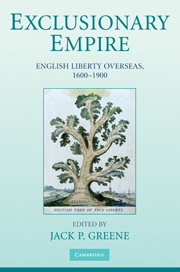Book contents
- Frontmatter
- Contents
- Notes on Contributors
- Preface
- Introduction
- 1 The Languages of Liberty in British North America, 1607–1776
- 2 Liberty and Slavery
- 3 “Era of Liberty”
- 4 Liberty and Modernity
- 5 Federalism, Democracy, and Liberty in the New American Nation
- 6 Liberty, Order, and Pluralism
- 7 Contested Despotism
- 8 “… a bastard offspring of tyranny under the guise of liberty”
- 9 How Much Did Institutions Matter?
- 10 The Expansion of British Liberties
- Index
Preface
Published online by Cambridge University Press: 05 June 2012
- Frontmatter
- Contents
- Notes on Contributors
- Preface
- Introduction
- 1 The Languages of Liberty in British North America, 1607–1776
- 2 Liberty and Slavery
- 3 “Era of Liberty”
- 4 Liberty and Modernity
- 5 Federalism, Democracy, and Liberty in the New American Nation
- 6 Liberty, Order, and Pluralism
- 7 Contested Despotism
- 8 “… a bastard offspring of tyranny under the guise of liberty”
- 9 How Much Did Institutions Matter?
- 10 The Expansion of British Liberties
- Index
Summary
The idea for this volume came to me in March 2003 during a colloquium I organized for Liberty Fund, Inc., in Santa Fe, New Mexico. Entitled “William Molyneux and Irish Liberty in the Eighteenth Century” and examining Molyneux's The Case of Ireland's Being Bound by Acts of Parliament in England Stated and the contemporary responses to it, the colloquium generated a lively discussion of the parallels and contrasts between Irish efforts to incorporate English ideas of liberty into the Irish polity during the Protestant Ascendancy and the attempts of free settlers to do the same in the new polities they constructed in North America and the Atlantic and West Indian islands during the seventeenth and eighteenth centuries. This discussion immediately suggested to me the desirability of a colloquium with a wider spatial and temporal focus that would explore the experience of the transmission, application, adaptation, and operation of English ideas of liberty – especially as they involved consensual governance, trial by jury, and the rule of law – to the wide variety of settlement societies associated with the British empire.
Although the spread of English liberty overseas through colonization has long been a central trope in popular works, in school books, and, before the advent of decolonization after World War II, in the historiography of the British empire, I was astonished to discover that no single work had ever taken up this subject in detail and began to think about organizing a book consisting of case studies, written by specialists, of each of the major settlement polities established by British people overseas between the advent of successful colonization around the turn of the seventeenth century and the turn of the nineteenth century, a book that would consider not just the spread of English liberty to those polities but also the extent and form that it took and the particular exclusions it involved.
- Type
- Chapter
- Information
- Exclusionary EmpireEnglish Liberty Overseas, 1600–1900, pp. ix - xivPublisher: Cambridge University PressPrint publication year: 2009

